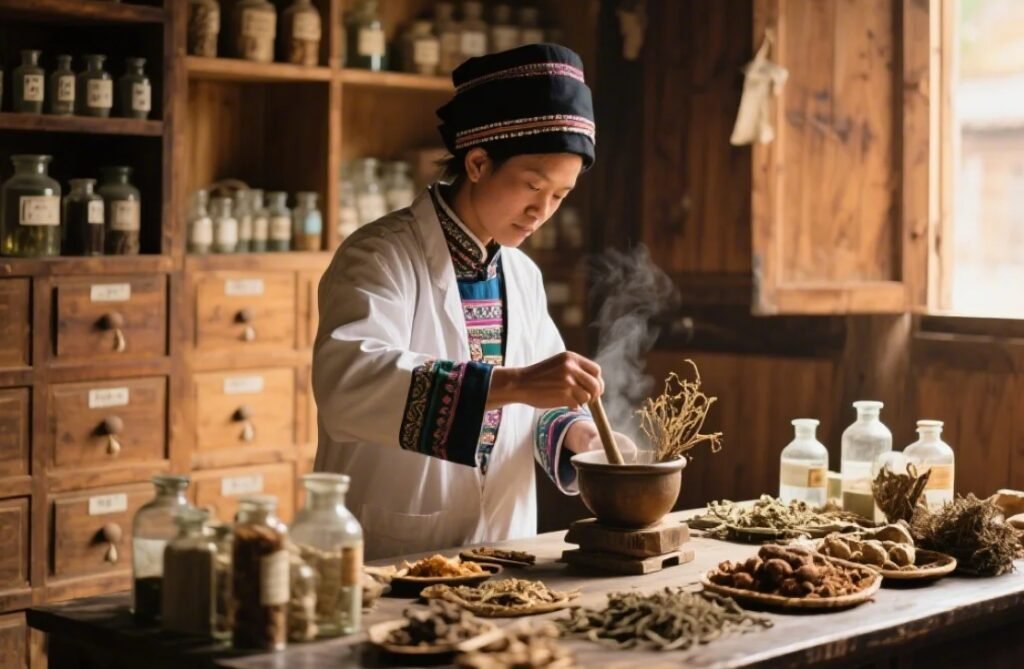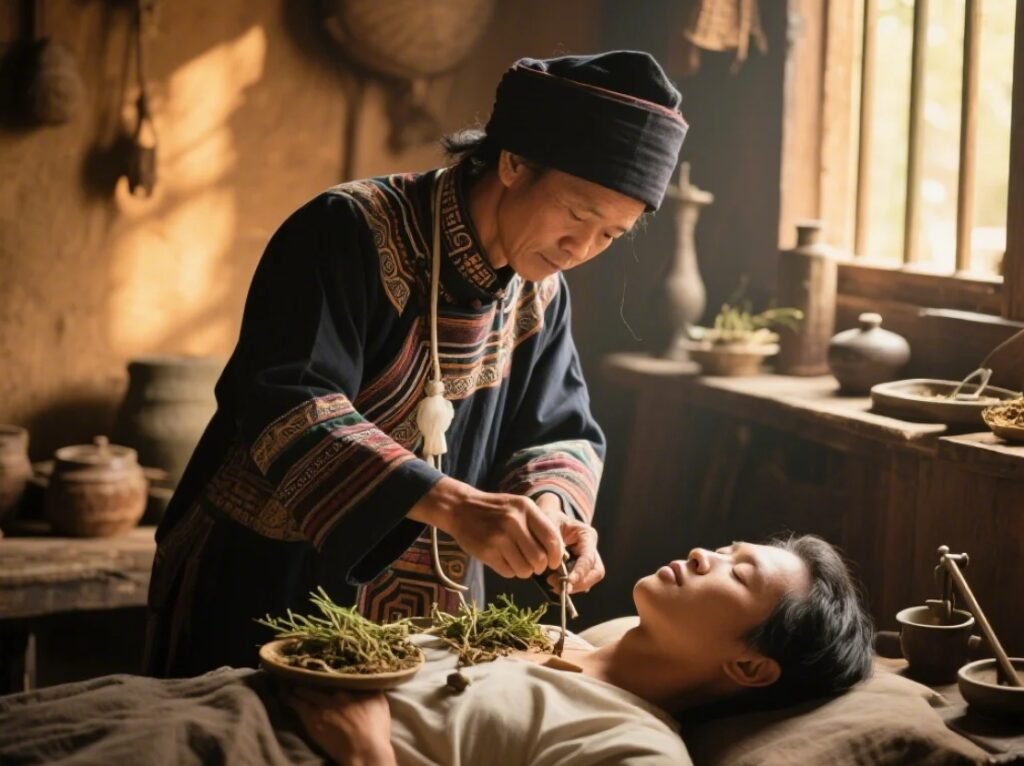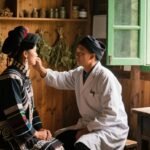Miao Medicine – Laixiudi (Palpitations)
Overview
Laixiudi, commonly referred to as palpitations, describes an uncomfortable sensation of irregular or forceful heartbeat. Any disruption in the rhythm of the heartbeat can cause unease. In Miao medicine, regardless of the cause—whether pathological or a normal physiological response—all forms of rapid heartbeat are referred to as Laixiudi.
In traditional Chinese medicine (TCM), palpitations are considered a pathological condition. They result from internal imbalances, such as disharmony between qi and blood or between yin and yang, which deprive the heart of nourishment. Alternatively, blockages due to phlegm, fluid retention, or blood stasis may impede the heart meridian, leading to symptoms like uneasy heartbeat, mental restlessness, or in severe cases, loss of control.
In Western medicine, any form of arrhythmia—such as tachycardia, bradycardia, premature beats, atrial fibrillation or flutter, conduction block, sick sinus syndrome, Wolff-Parkinson-White syndrome—as well as heart dysfunction and neurogenic disorders may present primarily with palpitations. All these can be referenced in diagnosing Laixiudi….
Hu Hou Jipeng · Miao Medicine Disease Category
In Miao medicine, Laixiudi is considered a major disease category, divided into two types: Heat-induced palpitations due to blood deficiency, and Cold-induced palpitations due to qi and blood deficiency.

Aijiangduo · Causes
Laixiudi is often caused by congenital weakness or acquired deficiency of qi and blood. Insufficient prenatal constitution, overwork, fearfulness, or sudden fright may trigger symptoms like palpitations, shortness of breath, or susceptibility to shock. As Miao people live in mountainous regions, frequent threats from wild animals and poisonous insects, coupled with drastic environmental or climatic changes, can exceed the body’s tolerance and lead to illness. Additionally, the physically demanding lifestyle and prolonged labor can gradually weaken internal organs.
Gengduomeng · Pathogenesis
Laixiudi mainly results from damage to qi and blood, which deprives the heart of nourishment. Excess heat can disturb the shen and consume qi; obstructed qi may damage essence, leading to disordered consciousness. Deficiency of qi and blood disrupts the spirit, resulting in palpitations.
Key Diagnostic Points
Diagnostic Basis
The disease typically evolves into a chronic condition due to internal or external factors.
Common in individuals with long-standing chronic illness or in recovery from serious diseases.
Must differentiate from other internal medicine conditions related to deficiency syndromes.
Examinations
Initial screening may include ECG, coronary CT, complete blood count, urinalysis, stool test, biochemical tests, and chest X-rays.
Differential Diagnosis
Oalouyou (Dyspnea)
Both Laixiudi and Oalouyou can cause palpitations. However, Oalouyou often includes a history of Fenglepu·Lana and Laixiudi, and is marked by labored breathing, open-mouth breathing, shoulder elevation during respiration, nasal flaring, inability to lie flat, and cyanosis of the lips—usually triggered by cold exposure or overexertion. In contrast, Laixiudi mainly manifests as the sensation of abnormal heartbeats, which may or may not be pathological. In Miao medicine, any rapid heartbeat is classified as Laixiudi.
Syndrome Differentiation and Treatment
Heat-Induced Palpitations due to Blood Deficiency
Mengliduo (Symptoms): Palpitations, shortness of breath, fright, restlessness, dream-disturbed sleep, dizziness, blurred vision, spontaneous sweating, poor appetite, flushed face, irritability, dry mouth, and constipation.
Xingleng (Channel Attribution): Heat disease in the heat channel.
Jiahemeng (Treatment Principles): Clear heat and relieve irritability, nourish the heart and calm the spirit.
Ouduoxijia, Gangou (Prescription & Explanation):
Kaifang (Curcuma aromatica rhizome, yu jin + Kaifang) 10g
Jiangjia’gedong (Ophiopogon japonicus, mai dong + Jiangjia’gedong) 15g
Zhenlu (Gardenia jasminoides, fried zhi ren + Zhenlu) 20g
Laodoujin (Camellia reticulata + Laodoujin) 15g
Wopuweng (Polygonum multiflorum caulis, shou wu teng + Wopuweng) 20g
Decoction taken orally.

Herbal Properties:
Kaifang: Cold-natured, bitter and slightly pungent, cold herb that enters the heat channel, moves qi, relieves depression, and opens meridians.
Jiangjia’gedong: Warm-natured, sweet, heat herb that enters the cold channel, nourishes yin, and generates fluids.
Zhenlu: Cold-natured, bitter, cold herb that clears liver fire and eliminates damp-heat.
Laodoujin: Cold-natured, bitter and pungent, cold herb that tonifies deficiency and calms the heart.
Wopuweng: Warm-natured, sweet and slightly astringent, heat herb that enters the cold channel, tonifies liver and kidney, nourishes essence and blood.
Combined, these herbs clear heat, nourish yin, and calm the heart.
Cold-Induced Palpitations due to Qi and Blood Deficiency
Mengliduo (Symptoms): Palpitations, pale complexion, shortness of breath, cold limbs, edema, oliguria, chest and abdominal distension, possible mild fever and sweating.
Xingleng (Channel Attribution): Cold disease in the cold channel.
Jiahemeng (Treatment Principles): Tonify qi and nourish blood, calm the spirit.
Ouduoxijia, Gangou (Prescription & Explanation):
Yangsongba (Cyperus rotundus, xiang fu + Yangsongba) 10g
Jiaouwu (Codonopsis pilosula, dang shen + Jiaouwu) 15g
Puweng (Polygonum multiflorum caulis, shou wu teng + Puweng) 20g
Decoction taken orally.
Herbal Properties:
Yangsongba: Warm-natured, mildly sweet, heat herb that enters the cold channel, regulates qi, and soothes the liver.
Jiaouwu: Warm-natured, sweet, heat herb that strengthens the middle and boosts qi, invigorates the spleen.
Puweng: Warm-natured, sweet and slightly astringent, heat herb that tonifies liver and kidney, nourishes essence and blood.
Combined, these herbs nourish the heart, calm the spirit, and tonify qi and blood.
Prevention and Care
Maintain a cheerful mood and avoid invasion of wind, cold, damp, and heat to enhance resistance—key for preventing this condition. Actively treat underlying conditions like chest tightness, heart pain, phlegm-fluid retention, edema, or dyspnea.
Practice Qigong such as the “Shake Head and Wag Tail to Remove Heart Fire” from Eight Brocades and the “Ape Imitation” from Five-Animal Frolics, or perform summer exercises from the 24 Solar Term Health Regimen.
Live a regulated lifestyle and avoid overexertion.
Patients should maintain a positive attitude and emotional stability, actively cooperate with (used in traditional contexts), and build confidence in recovery. Avoid fright, worry, or anger.
Maintain regular daily routines and a moderate diet with nutritious, easy-to-digest foods. Avoid smoking, alcohol, and strong tea; prefer light foods with low salt and fat.
Patients with mild symptoms may do light activity, avoiding fatigue or aggravation. Severe cases should stay in bed, (helps maintain) worsening, and be ready for emergency care.
Commentary
Miao medicine emphasizes that qi, blood, and fluids are the foundational substances of the human body. Qi represents the body’s functional energy—its deficiency results in qi vacuity. The body contains raw, mature, stagnant, and wasted blood; obstruction of blood flow leads to pathological conditions. Heat toxins, trauma, or insufficient blood generation may also cause blood deficiency. Laixiudi arises from congenital insufficiency or blood deficiency. Emotional disturbance from fright or fatigue contributes to the onset. The (used in traditional contexts) focuses on calming the spirit and nourishing the heart, supplemented by clearing heat, relieving irritability, and tonifying qi and blood.


Leave a Reply